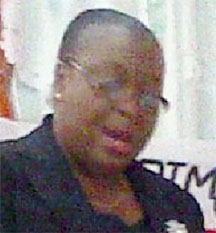Young men in today’s Guyana are at risk because too many of them refuse to do minimum wage work and end up getting into trouble.
Donna Chapman, Deputy Chief Education Officer with responsibility for administration, made this statement during her feature address at the Region Ten Department of Education, Regional Awards Ceremony at the Kara Kara Primary School, Linden on January 8th.
In a wide-ranging address, Chapman also praised students and teachers, including a number of retired teachers, who received awards at the function. According to her, the occasion was special for all the awardees because the event focused on celebrating their excellent performances. “Today, we are celebrating the achievements of both teachers and learners across several areas such as teacher training, assessment and examination, sports, and long and dedicated service. All of you, awardees made this day possible through your persistence, commitment and love for whatever you do. Today is a special day in your lives … so cherish this moment.”

The Deputy Chief Education Officer, however, echoed a repeatedly voiced concern by educators, probation officers and social workers that in many instances boys are not taking education seriously and girls are outperforming them.
“Our young men are at risk because too many of them do not want to work for minimum wage. Instead, they prefer to hang out in the streets, making themselves a nuisance, getting involved in criminal activities, or waiting to win the lotto,” Chapman said. “Our young men are at risk because their fathers are not there to provide that male role model and influence. In fact, too many of our fathers have a kind of remote control relationship with the boys and children in general.”
Chapman, who has functioned in the education system in every stratum – teacher, administrator and curriculum specialist – called for all hands to be on deck, including teachers, parents and community workers – to unite to save the nation’s young men. “We need to spend time telling our young men how to live their lives, provide pastoral care, giving them some valued education and family life education. We need to teach boys and men to communicate and associate and also to express anger without resorting to acts of violence.”
She made a special appeal to the comparatively few male awardees at the ceremony to be role models to their peers as well as serve as change agents to young Guyanese males. “Male awardees, you are symbols of hope. You are the promise for a better Guyana and the world. You are our promise to eliminate violence against women. You are that rainbow for a better educated male population and I say to you adopt a male child. Be a father, be a big brother, be a good friend, who is positive and give advice. Help them focus, help their social skills, values and morals.”

She added that it is worrying that too often good and excellent performers are in the minority and, in some cases, excellent performers are made to feel strange, or are isolated and alienated. According to her, many times when persons are alienated because they perform well, they slacken up because they want to fit in with the crowd and so they become mediocre performers. She advised the awardees to the contrary: “Never become mediocre, average at whatever you do.”




